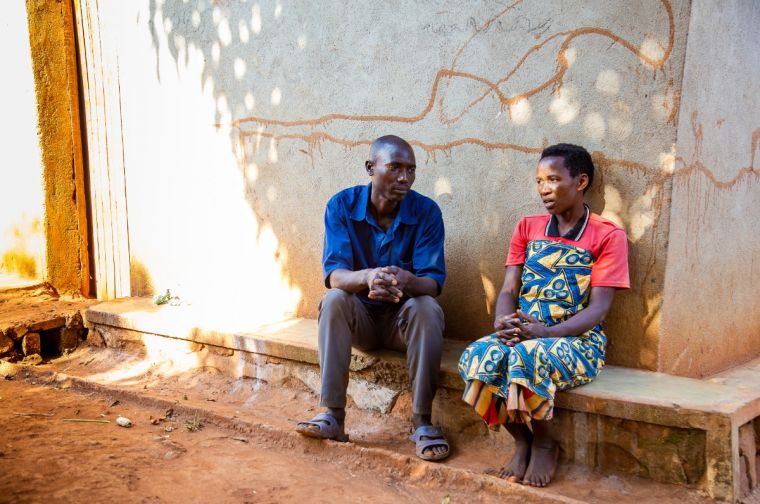How the Church is helping to build a lasting peace in Burundi

This year, Tearfund's Christmas appeal is in support of Burundi, a country that is trying to move on from years of conflict and bloodshed.
Désiré Majambere, Tearfund's Country Director for Burundi, speaks to Christian Today about why the Church is so important to the country's prospects for a lasting peace and what he's learned through years of painstaking work building relationships, supporting dialogue, and fostering reconciliation.
CT: What kind of pain and trauma have you witnessed in your years of peace and reconciliation work?
Désiré: I've been working in camps for internally displaced persons for over 15 years. During that time I have supported women whose husbands have been killed, children who have lost their parents, people suffering because they do not have any shelter or food, clothes or access to education and medical treatment. There are people who have lost everything, their property, their houses, everything they had.
CT: Burundi has suffered from years of conflict. What kind of impact has that had on communities?
Désiré: When there is conflict among people for many years, first of all there is a lot of suspicion. Relationships are broken and they don't support each other. Everyone sees everyone else as their enemy so it makes it hard for them to sit together and talk.
CT: How do you go about overturning all those years of suspicion?
Désiré: It is a long process to bring trust back into the communities. One of the most important tools is community dialogue, getting the people to sit down together and discuss the issues facing their communities. At Tearfund, we want them to look at each other not as enemies but as the friends that they share the community with. It is important to create a space where they can come together to find sustainable solutions to the problems they have in common and we have trained peace champions in the communities who work to create and support this space for dialogue.
CT: What involvement does the Church have in this work?
Désiré: The Church is very active and it was important that we engage the Church because in Burundi, church and religious leaders have a very strong influence in their communities. Around 95 per cent of the population is either Christian or Muslim and there are churches everywhere in Burundi. So we bring Christian and Muslim leaders to sit together in the same space to develop a common understanding about the situation in the country and discuss ways that they can positively influence politicians and decision-makers.
This collaboration was especially important during the 2020 elections because together they created a language of peace. Instead of a situation where people had to leave the country as refugees, we have seen people returning back to Burundi because the elections passed off peacefully. There was no bloodshed as there was during previous years, only peace.
Christian and Muslim leaders did not always come together like this. It took a lot of time to build relationships with senior church and Muslim leaders. But it is so important for them to sit together and have a common language because they have huge influence on politicians and decision-makers. I believe that the country normally reflects the image of the Church. When the church leaders are united, the country leaders will also be united.
CT: What are some of the needs of returning refugees?
Désiré: Their needs are huge but first among them is the need for peace and security. Some have been away for five, 10, 15 years so when they come back to the country, they need to feel secure and be socially reintegrated so we run self-help groups and solidarity groups. Some have returned empty handed so they need financial support. We give them land and show them how to grow different crops so that they can take care of their families and increase their income to pay for medical treatment or education for their children. We give them the help they need to start a new life.
CT: What lessons have you learned about peace and reconciliation, especially those that could be applied to different contexts?
Désiré: What I have seen is that wherever there are people there is conflict, but the good news is that this conflict can be resolved peacefully. However, that requires a space where people can sit down together to find sustainable solutions to their problems and it requires a win-win approach. What I mean by that is a compromise approach that keeps people together.
What I have noticed in my years of doing this work is that churches are a good space for the community because people trust church leaders, so when church leaders stand up united as one voice it can bring huge transformation, and sustainable peace and reconciliation.
We saw this during the 2020 elections when they worked hard to mitigate security issues and the tensions among the young people. They shared many messages of peace and this is why there were no deaths or bloodshed. Instead there was peace and we are grateful that this peace has been sustained until now. Now this model is being successfully rolled out in neighbouring Chad and Mozambique, bringing together church leaders in those nations to build peace and reconciliation.
CT: Are you optimistic that Burundi can leave conflict in the past and move towards a lasting peace in the future?
Désiré: That is our hope and prayer. We want it to be a peaceful country where people feel safe to return and stay. But we aren't just praying, we are also acting and doing the practical work of building a sustainable peace where people can live without fear and have a hope for the future.
To give to the Tearfund appeal, visit www.tearfund.org/ChristmasBurundi











